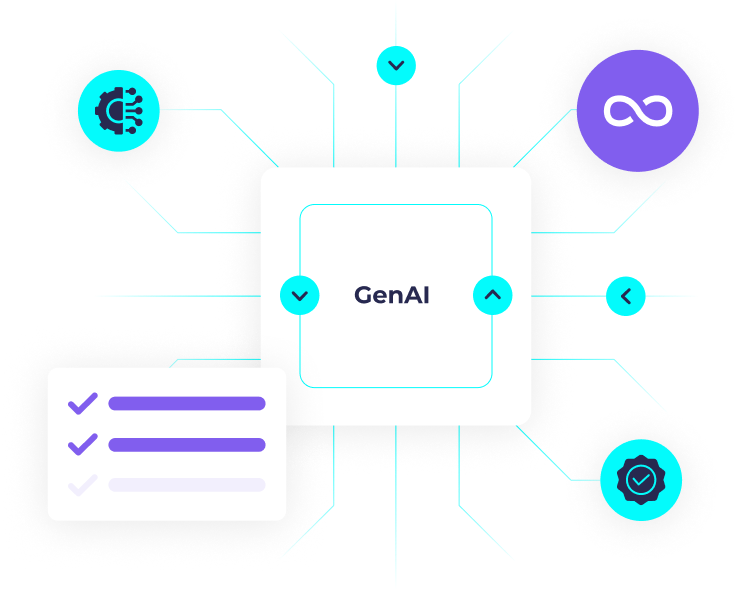Table of Contents Hide
How AI Test Data is Transforming Test Data Management Efficiency
 7 MIN. READING
7 MIN. READING
Why AI Test Data is Essential for Modern Software Development
In the rapidly evolving world of software development, the demand for efficient and reliable test data management (TDM) is more critical than ever. AI test data, a groundbreaking approach powered by artificial intelligence, is transforming the way organizations handle test data, making processes faster, more accurate, and more scalable. In this article, we’ll explore what AI test data is, its significance, and how it is reshaping the landscape of test data management.
What is Test Data?
Before diving into AI test data, it’s essential to understand the basics: What is test data? Test data refers to the data used in software testing to validate the functionality, performance, and security of a system. It is crucial for ensuring that software applications work as intended under various conditions. Test data can be real or synthetic, and its quality directly impacts the accuracy of testing outcomes.
Traditional methods of managing test data often involve manual processes, which can be time-consuming and prone to errors. As the complexity of software systems increases, so does the need for more sophisticated approaches to handling test data. This is where AI-driven solutions come into play.
The Role of AI in Test Data Management
AI test data represents a paradigm shift in how test data is generated, managed, and utilized. By leveraging artificial intelligence and machine learning algorithms, AI-generated test data solutions can automate the creation, management, and analysis of test data with unprecedented efficiency and precision.
Benefits of AI Test Data
- Automation and Efficiency: One of the most significant advantages of AI test data is automation. AI can automatically generate test data that meets specific criteria, reducing the need for manual data creation and minimizing human error. This not only speeds up the testing process but also ensures consistency across different test scenarios.
- Improved Data Quality: AI-driven tools can analyze vast amounts of data to identify patterns and anomalies that may not be apparent through manual inspection. This leads to the generation of higher-quality test data that more accurately represents real-world conditions, resulting in more reliable testing outcomes.
- Scalability: As organizations scale their operations, the need for large volumes of test data increases. AI test data solutions can quickly generate large datasets that are tailored to the specific needs of the testing process, enabling organizations to keep pace with the demands of modern software development.
- Cost Reduction: By automating test data management, organizations can significantly reduce the costs associated with manual data creation, storage, and maintenance. Additionally, AI test data solutions can help identify inefficiencies in the testing process, leading to further cost savings.
- Enhanced Security and Compliance: AI-generated test data solutions can be configured to generate anonymized or masked data, ensuring that sensitive information is protected. This is particularly important for organizations that must comply with strict data protection regulations, such as GDPR or HIPAA.
Use Cases for AI Test Data
It can be applied in various scenarios to improve the effectiveness and efficiency of software testing:
- Regression Testing: AI can automatically generate test data that covers a wide range of scenarios, ensuring that new software updates do not introduce bugs or errors.
- Performance Testing: AI-driven tools can simulate different levels of user activity to test the performance of a system under various conditions, helping to identify potential bottlenecks or scalability issues.
- Security Testing: AI can be used to create test data that mimics real-world attack patterns, allowing organizations to identify and address security vulnerabilities before they can be exploited.
- Data Anonymization: AI test data solutions can automatically anonymize sensitive information, enabling organizations to use real-world data in testing without compromising privacy.
How AI-Generated Test Data Works
To fully appreciate the value of AI test data, it’s helpful to understand how it works. AI-driven test data management involves several key processes:
Data Generation
AI algorithms can generate synthetic test data that closely mirrors real-world data. This process involves analyzing production data to understand its structure and distribution, then creating synthetic data that replicates these characteristics. The result is a rich, diverse data set that can be used to test a wide range of scenarios.
Data Anonymization
Data privacy is a major concern in today’s digital world, and AI plays a crucial role in ensuring that test data is anonymized. AI-driven anonymization techniques can identify and mask sensitive information in test data, ensuring that it complies with data protection regulations. This allows organizations to use real-world data in testing without compromising security.
Data Management and Storage
AI can also streamline the management and storage of test data. By automating data organization and storage processes, AI ensures that test data is easily accessible, properly categorized, and securely stored. This not only simplifies the testing process but also reduces the risk of data loss or corruption.
Challenges and Considerations
While AI test data offers significant advantages, it’s important to be aware of potential challenges:
- Initial Investment: Implementing AI-driven TDM solutions may require a significant upfront investment in terms of time, money, and resources.
- Data Quality: The quality of AI-generated test data is only as good as the data it’s trained on. Ensuring high-quality production data is essential for accurate test data generation.
- Skill Gap: Organizations may face a learning curve when adopting AI-driven TDM, particularly if their team lacks experience with AI and machine learning technologies.
How Accelario Uses AI in Its Data Anonymization Solution
Accelario’s AI-driven Data Anonymization solution is designed to protect sensitive information while maintaining the integrity and usability of test data. By leveraging advanced AI algorithms, Accelario can automatically detect and anonymize sensitive data elements across various datasets, ensuring that organizations remain compliant with data protection regulations such as GDPR and HIPAA. The AI technology employed by Accelario identifies patterns and relationships within the data, enabling it to anonymize complex data structures without compromising the data’s relevance for testing purposes.

Moreover, Accelario’s AI-driven test data management approach allows for dynamic data masking, which adjusts in real-time as the data changes, ensuring continuous protection. This process not only safeguards personal and confidential information but also enhances the efficiency of test data management by eliminating the need for manual intervention. By automating the data anonymization process, Accelario’s solution reduces the risk of human error, accelerates testing cycles, and provides organizations with the confidence that their test data is both secure and compliant.
The Future of AI Test Data
As AI technology continues to evolve, the potential for AI-generated test data to transform the software testing landscape is immense. Future advancements may include even more sophisticated algorithms capable of generating highly realistic synthetic data, as well as deeper integration with other AI-driven tools in the SDLC.
Predictions for AI Test Data
- Greater Adoption Across Industries: As more organizations recognize the benefits of AI test data, adoption rates are expected to increase across various sectors.
- Improved AI Algorithms: Ongoing research in AI and machine learning is likely to lead to more advanced algorithms capable of generating even more accurate and relevant test data.
- Integration with Other AI Tools: AI test data solutions will likely become more integrated with other AI-driven tools, such as automated testing frameworks and continuous integration/continuous delivery (CI/CD) pipelines, creating a seamless and efficient testing process.
Conclusion
AI-generated test data is revolutionizing the way organizations manage their test data, offering numerous benefits such as automation, improved data quality, scalability, and cost reduction. As AI technology continues to evolve, we can expect to see even more advanced AI-driven solutions that further enhance the efficiency and effectiveness of software testing.
For organizations looking to stay ahead of the curve, investing in AI test data solutions is a strategic move that can help them achieve faster, more accurate, and more reliable testing outcomes. By embracing this cutting-edge technology, organizations can ensure that their software applications meet the highest standards of quality and performance.


